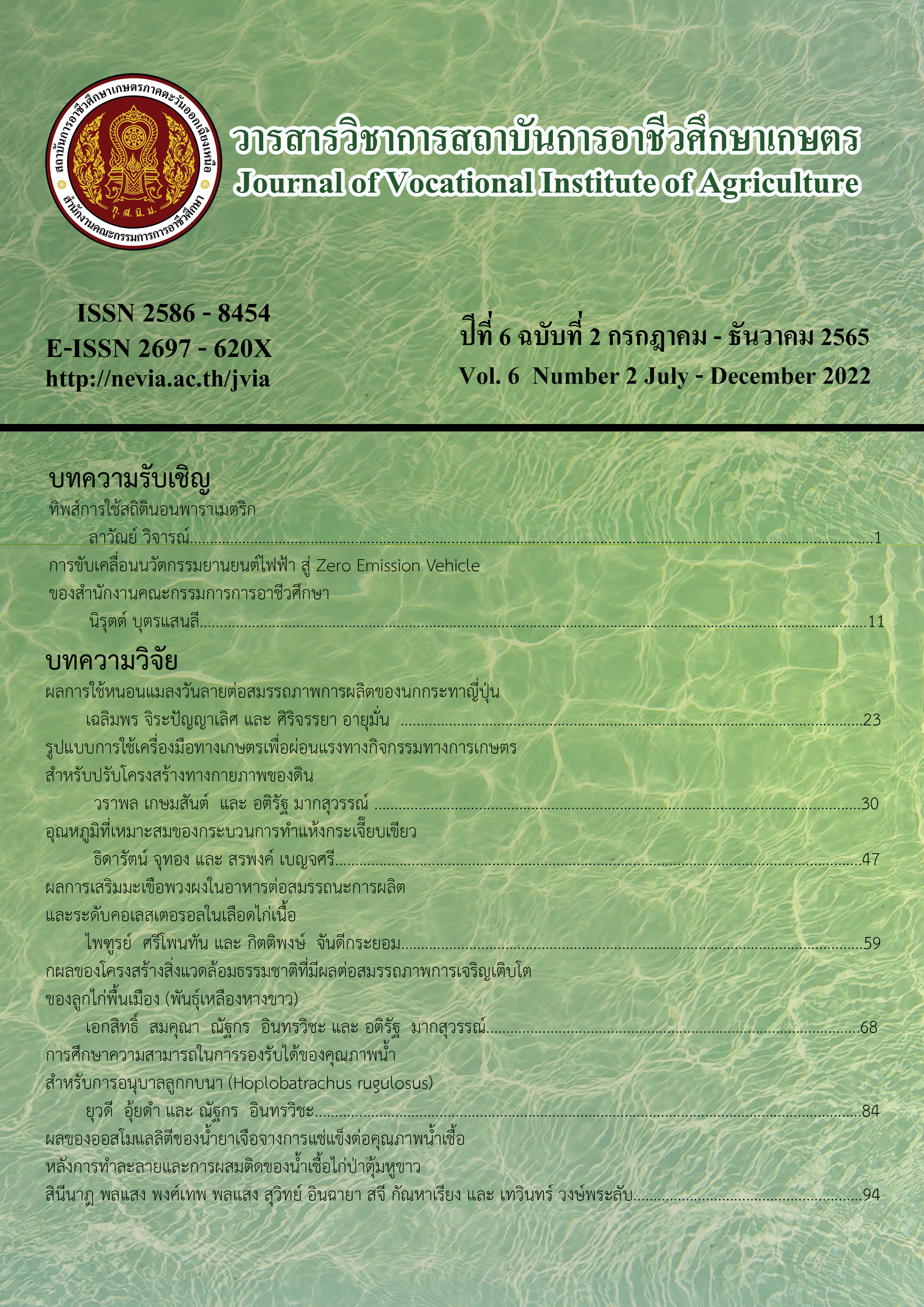Effects of Dietary Supplementation of Turkey Berry Powder (Solanum torvum Swartz.) on Productive Performance and Blood Cholesterol Levels of Broiler
Main Article Content
Abstract
Using herbs in animal husbandry is one way to reduce the use of antibiotics. Turkey berry (Solanum torvum Swartz.) is a type of medicinal plants that has active ingredients in inhibiting pathogenic fungi and bacteria. Therefore, this study aimed to investigate effects of Turkey berry powder supplementation in the diet on productivity and blood cholesterol levels of broiler. A total of ninety six,1-day-old arbor-acre, broilers were randomly selected for this trial. They were divided into 4 groups and 3 replications with 8 chickens each. There were 4 treatments, the chickens were fed with broiler feed mixed with Turkey berry powder at 0, 0.4, 0.7 and 1%. They were fully fed and watered. The results of a 42-day-trial revealed that the broilers in the treatments 1, 2, 3 and 4 had the average adequate feed intakes at 4478.20, 4476.66, 4447.73 and 4490.75 g/head (P>0.05), and had the average body weight gains at 1,952.30, 2,062.56, 2,108.94 and 2,084.75 g/head (P< 0.01), respectively. The average growth rates of the broilers in treatments 1, 2, 3 and 4 were 46.48, 49,10, 50.21 and 49.63 g/body/day (P< 0.01), average feed conversion ratios were 2.29, 2.17, 2.11 and 2.15 (P< 0.01), average carcass percentages were 82,24, 83.90, 84.43 and 83.79 percent (P< 0.01), respectively. The average visceral fats of the chickens in treatments 1, 2, 3 and 4 were 3.45, 2.20, 2.22 and 2.18 percent (P< 0.01), average food costs per kilogram body weight gain were 38.87, 37.37, 37.07 and 38.36 baht (P< 0.01), and the average cholesterol in the blood were 140.75, 129.25, 140.75 and 130.75 milligrams per deciliter (P>0.05), respectively. It was concluded that the addition of Turkey berry powder at the level of 0.4–1.0 percent had an effect on increasing the productivity of broiler and the carcass percentage improved.
Article Details

This work is licensed under a Creative Commons Attribution-NonCommercial-NoDerivatives 4.0 International License.
The content and information in articles published in the Journal of Vocational Education in Agriculture are the opinions and responsibility of the article's author. The journal editors do not need to agree or share any responsibility.
Articles, information, content, etc. that are published in the Journal of Vocational Education in Agriculture are copyrighted by the Journal of Vocational Education in Agriculture. If any person or organization wishes to publish all or any part of it or to do anything. Only prior written permission from the Journal of Vocational Education in Agriculture is required.
References
สำนักงานเศรษฐกิจการเกษตร. (2564). สถานการณ์การส่งออกไก่เนื้อของไทย. เข้าถึงได้จาก https:// api.dtn.go.th/files/v3/60f91710ef4140b37906fdfc/download.
อังสุมา แก้วคต. (2563). การใช้สมุนไพรเพื่อลดการใช้ยาปฏิชีวนะในอาหารสัตว์และการตกค้างในเนื้อสัตว์. เข้าถึงได้จาก http://scimooc.bsru.ac.th/index.php?type=&page=4.
ดุจดาว คนยัง และคณะ. (2553). การใช้สมุนไพรไทยในการเพิ่มสมรรถภาพการเจริญเติบโตและควบคุม โรคบิดในไก่เนื้อ. (รายงานผลการวิจัย). เชียงใหม่: มหาวิทยาลัยแม่โจ้.
กัญจนา ดีวิเศษ. (2548). ผักพื้นบ้านภาคเหนือ. พิมพ์ครั้งที่ 2. กรุงเทพฯ: ศูนย์พัฒนาตำราการแพทย์
แผนไทย.
Abdulaziz R. A., et al. (2016). In vitro antioxidant activity of the ethanolic extract from fruit, stem, and leaf of Solanum torvum. ScienceAsia, 42, 184-189.
Keisuke, T., et al. (2010). Methyl caffeate as an alpha-glucosidase inhibitor from Solanum torvum fruits and the activity of related compounds. Bioscience, Biotechnology and Biochemistry, 74(4), 741- 745.
SAS Institute Inc. (1985). SAS user’s guide basics. 5th Ed. Cary NC: SAS Institute Inc.
ไพฑูรย์ ศรีโพนทัน และ ธัญญา คงนวลอินทร์. (2559). ผลการศึกษาผลของการเสริมสารโพลีฟีนอลที่ สกัดจากเปลือกเมล็ดมะขามในอาหารต่อสมรรถนะการผลิตไก่เนื้อ. (รายงานผลการวิจัย). มหาสารคาม: วิทยาลัยเกษตรและเทคโนโลยีมหาสารคาม.
Acharyya, S. & Khatun, B. (2018). Antimicrobial and analgesic activity of Solanum torvum. Haya: The Saudi Journal of Life Sciences, 3(6), 459-464.
เอกสิทธิ์ สมคุณา และคณะ. (2558). ผลของการเสริมกวาวเครือขาว ขมิ้นชันและฟ้าทะลายโจรในอาหารต่อสมรรถนะการเจริญเติบโตของไก่เนื้อ. แก่นเกษตร, 43(1), 478–483.
เพชรรัตน์ พงศ์จรรยากุล. (2530). ฤทธิ์ของแอนโดรกราไฟไลด์ต่อกล้ามเนื้อเรียบของกระเพาะและลำไส้. (วิทยานิพนธ์ปริญญามหาบัณฑิต, จุฬาลงกรณ์มหาวิทยาลัย).
ไชยวรรณ วัฒนจันทร์. (2554). การเสริมสารสกัดหยาบจากขมิ้นชัน (Curcuma longa Linn.) ในอาหารไก่กระทงต่อผลการทดสอบทางประสาทสัมผัสเนื้อ. แก่นเกษตร, 39(ฉบับพิเศษ), 17-21.
วิชัย เชิดชีวศาสตร์. (2552). นวัตกรรมสมุนไพรกวาวเครือ. กรุงเทพฯ: วี พริ้นท์.
Wannasiri, S., et al. (2017). Effects of Solanum torvum fruit water extract on hyperlipidemia and sex hormones in high-fat fed male rats. Asian Pacific Journal of Tropical Biomedicine, 7(5), 401-405.
ปวีณา ปัญจธารากุล และ นริสา เก่งตรง บดีรัฐ. (2564). ประสิทธิภาพของระดับไขมันในช่องท้องในการประเมินความเสี่ยงโรคคาร์ดิโอเมแทบอลิกซินโดรมในกลุ่มทหารเรือไทย. วารสารเทคนิคการแพทย์, 49(2), 7767-7779.
ไพฑูรย์ ศรีโพนทัน และ ธัญญา คงนวลิอนทร์. (2561). ผลของการเสริมเนื้อในเมล็ดฟักข้าวในอาหาร
ต่อสมรรถนะการผลิตของไก่เนื้อ. วารสารวิชาการสถาบันอาชีวศึกษาเกษตร, 1(2), 26-32.

